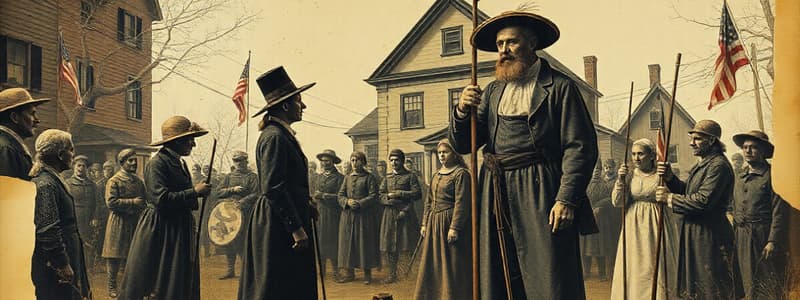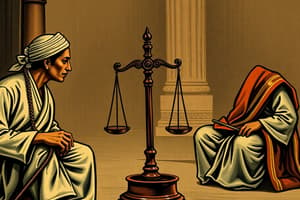Podcast
Questions and Answers
Which of the following crimes could lead to a death penalty in Colonial America?
Which of the following crimes could lead to a death penalty in Colonial America?
- Drunkenness
- Theft
- Murder (correct)
- Breaking the Sabbath
Colonial America's Puritans required attendance at Sunday Worship.
Colonial America's Puritans required attendance at Sunday Worship.
True (A)
Name one punishment used in New England for lesser crimes such as drunkenness.
Name one punishment used in New England for lesser crimes such as drunkenness.
Stocks
During the Salem Witch Trials, _____ women were falsely accused of being witches.
During the Salem Witch Trials, _____ women were falsely accused of being witches.
Match the following crimes to their punishments in Colonial America:
Match the following crimes to their punishments in Colonial America:
What material were the homes primarily made of?
What material were the homes primarily made of?
The town had ample lighting due to the widespread use of glass lamps.
The town had ample lighting due to the widespread use of glass lamps.
Which of the following established the idea that the power of the monarch was limited by law?
Which of the following established the idea that the power of the monarch was limited by law?
Colonists believed they should have a voice in the English government.
Colonists believed they should have a voice in the English government.
What community effort was mentioned related to fire safety?
What community effort was mentioned related to fire safety?
What two rights were established by the English Bill of Rights in 1689?
What two rights were established by the English Bill of Rights in 1689?
The streets of the town were primarily made of ______.
The streets of the town were primarily made of ______.
Match the following lighting sources with their characteristics:
Match the following lighting sources with their characteristics:
The act that established the power to make and impose taxes belonged to the __________.
The act that established the power to make and impose taxes belonged to the __________.
Match the following political claims with their descriptions:
Match the following political claims with their descriptions:
What is the likely name of the described instrument?
What is the likely name of the described instrument?
The notes indicate that the Consequentiae instrument fell out of use.
The notes indicate that the Consequentiae instrument fell out of use.
What major event is mentioned in relation to the instrument's history?
What major event is mentioned in relation to the instrument's history?
The Consequentiae instrument is associated with 'the first' and a period of _______.
The Consequentiae instrument is associated with 'the first' and a period of _______.
Match the following aspects of the Consequentiae instrument with their descriptions:
Match the following aspects of the Consequentiae instrument with their descriptions:
What was the primary educational belief regarding boys among colonialists?
What was the primary educational belief regarding boys among colonialists?
Colonial women received education in subjects beyond writing and arithmetic.
Colonial women received education in subjects beyond writing and arithmetic.
What type of education did women primarily receive in colonial times?
What type of education did women primarily receive in colonial times?
Most colonists believed that ______ needed more education than ______.
Most colonists believed that ______ needed more education than ______.
Match the following gender with their perceived educational needs in colonial times:
Match the following gender with their perceived educational needs in colonial times:
What percentage of the population lived in cities during the 1750s?
What percentage of the population lived in cities during the 1750s?
Taverns in the 1750s served only alcoholic drinks.
Taverns in the 1750s served only alcoholic drinks.
Name two products commonly found at the market place in Colonial cities.
Name two products commonly found at the market place in Colonial cities.
Ships brought _____ from England to the waterfront.
Ships brought _____ from England to the waterfront.
Match the following types of shops with their services:
Match the following types of shops with their services:
What was the primary reason for the rapid expansion of slavery in the Southern Colonies during the 1700s?
What was the primary reason for the rapid expansion of slavery in the Southern Colonies during the 1700s?
The Middle Passage was a humane and comfortable journey for enslaved Africans.
The Middle Passage was a humane and comfortable journey for enslaved Africans.
Name two types of work that enslaved Africans might perform on plantations.
Name two types of work that enslaved Africans might perform on plantations.
The _______ Slave Trade involved the exchange of enslaved Africans for goods such as cloth and guns.
The _______ Slave Trade involved the exchange of enslaved Africans for goods such as cloth and guns.
Match the following roles of enslaved Africans with their responsibilities:
Match the following roles of enslaved Africans with their responsibilities:
What was one major impact of the First Awakening during Colonial America?
What was one major impact of the First Awakening during Colonial America?
Which of the following describes the lower class in colonial America?
Which of the following describes the lower class in colonial America?
The Great Awakening emphasized that individuals were equal in the eyes of religious authority.
The Great Awakening emphasized that individuals were equal in the eyes of religious authority.
Middle class individuals in colonial America were not allowed to vote.
Middle class individuals in colonial America were not allowed to vote.
What were revival meetings aimed at during the Great Awakening?
What were revival meetings aimed at during the Great Awakening?
What type of clothing did upper-class individuals typically wear?
What type of clothing did upper-class individuals typically wear?
During the Great Awakening, the ________ Puritans ensured that everyone attended church services.
During the Great Awakening, the ________ Puritans ensured that everyone attended church services.
Match the following concepts related to the First Awakening with their descriptions:
Match the following concepts related to the First Awakening with their descriptions:
The upper class in colonial America was largely defined by wealth, occupations, and inherited __________.
The upper class in colonial America was largely defined by wealth, occupations, and inherited __________.
Match the following classes in colonial America with their characteristics:
Match the following classes in colonial America with their characteristics:
What was the primary source of heat and cooking in colonial farm life?
What was the primary source of heat and cooking in colonial farm life?
Nine out of ten people lived in cities during colonial America.
Nine out of ten people lived in cities during colonial America.
Name one type of chore that was commonly performed on colonial farms.
Name one type of chore that was commonly performed on colonial farms.
Colonial farmers had to clear the land of __________ before they could farm.
Colonial farmers had to clear the land of __________ before they could farm.
Match the following chores with their descriptions:
Match the following chores with their descriptions:
Flashcards are hidden until you start studying
Study Notes
Colonial Assembly
- Colonial assembly imposed punishments related to murder, treason and piracy.
New England Jail
- Punishments under New England law included jail time for offenses like theft, forgery and highway robbery.
- Corporal punishment, such as whipping and branding were also prevalent.
Lesser Crimes
- Drunkenness and breaking the Sabbath were considered lesser crimes.
- These transgressions were typically punished by being put in the stocks - a form of public shaming.
New England Puritans (1691)
- Puritans held strong religious beliefs and enforced them through laws known as "Blue Laws".
- These laws mandated that all people attend church services held in the town meeting house on Sunday.
- They believed it was important to “watch for Satan” in all aspects of life.
- The Salem Witch Trials serve as a dark example of the Puritan beliefs, leading to the false accusation and imprisonment of 29 women.
Magna Carta
- The Magna Carta limited the power of the monarch, establishing the concept that even the King was not above the law.
English Bill of Rights (1689)
- The English Bill of Rights established the power to make laws and impose taxes as belonging to the people's elected representatives.
- It also affirmed fundamental rights including:
- The right of petition to the King.
- The right to trial by jury.
Consequentia Instrument
- It's a historical or fictional instrument, likely a Consequentia.
- The instrument's status or use seems to have fluctuated throughout history.
- Its history is intertwined with a rebel or someone who ran away, perhaps a historical or social event, and the first of something.
- The notes mention “the first” suggesting a timeline or a specific historical period, but it is unclear.
Colonial Education
- Colonists prioritized education for boys.
- Girls received basic education, typically writing and arithmetic.
Colonial City Life in 1750s
- Ships brought news from England and goods like paints, carpets, furniture, and books to the city waterfront.
- The market place offered a variety of farm products like fresh fish, eggs, milk, and cheese.
- Taverns provided food and drink.
- Shops in the city offered a range of services, including:
- Blacksmiths
- Shoemakers
- Clockmakers
- Silversmiths
- Tailors
- Barbers
- Wig makers
Slave Trade: 1700s
- The first enslaved Africans arrived in Virginia, and by the 1700s, they were present in every colony.
- Slavery expanded rapidly in the Southern Colonies to support plantations and agricultural production, including tobacco, rice, indigo, and other cash crops.
Profitable Atlantic Slave Trade
- Slaves from West Africa were taken in exchange for goods like cloth, guns, and rum.
- The harrowing journey across the Atlantic known as the "Middle Passage" was characterized by overcrowding, lack of food, sickness, and death.
Slave Work
- Enslaved Africans held various roles, including:
- Field work
- Handling horses
- Carpentry
- Blacksmithing
- Gardening
- Midwifery
Social Hierarchy
- Slaves occupied the bottom of the social hierarchy, reflected in a pyramid shape diagram depicting the social order.
The Great Awakening (1730s)
- It was a religious revival movement.
- It helped to pave the way for the American Revolution.
- The Great Awakening arose from a sense that people had lost their religious faith.
- Revival meetings were held to reinvigorate religious fervor.
- The passionate words of preachers touched the hearts of many colonists.
- The movement affirmed the idea of equality in the eyes of God.
Colonial American Class Differences
- The upper class was characterized by wealth, occupation, and inherited status, including successful planters, merchants, and lawyers.
- Their attire reflected their status, often adorned with gold, silver, wigs, boots, and decorative buttons.
- The middle class owned land and businesses, including farmers, artisans, and craft workers.
- They were allowed to vote and dressed in a range of styles from plain to colorful clothing.
- The lower class consisted of farmhands, laborers, and those with limited economic or political freedoms, including indentured servants and slaves, who were not allowed to vote.
Farm Life in Colonial America
- The majority of the population (9 out of 10) lived on small farms.
- The colonial economy relied heavily on farming, commerce, and the buying and selling of goods.
Farm Tasks
- Farm tasks included clearing land of trees, building homes, as well as daily chores.
- Basic tools were used for felling trees.
- Chores included cutting wood, tending to animals and crops, and making tools.
Farm Living
- Most farmhouses were single-room structures with a chimney.
- The fireplace served as the primary source of heat for warmth and cooking.
- Firewood was essential for survival.
- Cooking was considered dangerous due to heavy pots and the risk of fire-related accidents.
Time Schedule
- The document mentions a possible daily or weekly schedule, unfortunately, it cannot be fully read due to its condition.
Studying That Suits You
Use AI to generate personalized quizzes and flashcards to suit your learning preferences.



